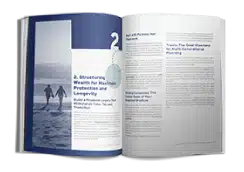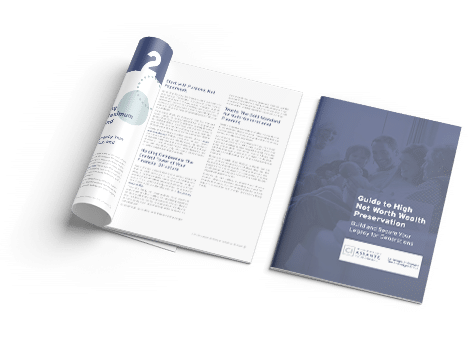Contents
Get Your Free eBook
The High Net Worth Guide to Wealth Preservation

Get Your Free eBook
The High Net Worth Guide
to Wealth Preservation

Estate Planning and Succession for HNW Families
Shaping A Legacy that Lasts Beyond A Lifetime
Estate planning for high-net-worth (HNW) individuals might seem like a lot of paperwork left to professionals like lawyers, notaries, and financial planners. In reality, it is much more than drafting documents, and it requires your involvement to shape the future you envision for your family and community. Yes, there are legal frameworks, tax strategies, and financial structures to navigate with professional assistance. But beneath it all lies a deeper question: What story will your wealth tell when you’re no longer here to tell it yourself?
With intention, clarity, and care, estate planning becomes less about dividing assets and more about uniting purpose. It is a form of leadership, ensuring that your legacy continues to serve, inspire, and uplift your heirs and beneficiaries.
What Makes HNW Estate Planning Unique?
Estate planning for high-net-worth individuals is a multi-layered endeavour that requires a different playbook. While one foundational layer will be deciding who inherits what, other equally important aspects involve orchestrating the smooth transfer of complex wealth, such as multiple properties, investment portfolios, private businesses, trusts, and sometimes even assets across borders.
This level of planning requires a harmonious integration of legal, tax, and emotional considerations. For example, transferring ownership of a cherished family retreat might involve intricate legal structures and significant tax planning, but it also requires sensitivity to the memories, traditions, and connections tied to that place. It’s the balance between the technical and the human that constitutes successful estate planning as part of a comprehensive wealth management strategy for high-net-worth individuals.
Building a Values-Aligned Estate Plan
True estate planning for high-net-worth individuals begins with vision. Before you decide on structures or timelines, you need to define the legacy you want to leave. How do you envision it being put to use, purposefully? Is it about safeguarding your family’s summer cottage for future generations? Ensuring that every grandchild has access to higher education? Creating a philanthropic foundation that carries forward your values long after you’re gone? In short, what do you want your wealth to do?
If your vision is to preserve the family’s history and togetherness, that might mean structuring shared ownership and responsibilities for certain assets. If your goal is to foster opportunity, it could mean establishing dedicated funds to support education, entrepreneurship, or charitable work. When you anchor your estate plan in your personal values, every subsequent decision becomes clearer. This values-first integrated approach to estate planning gives your wealth lasting power to endure and continue to support meaningful work in the world.
Managing Heirs and Family Dynamics
The human side of estate planning for high-net-worth individuals often comes down to one of the most delicate questions: How do you pass on wealth without creating conflict? How do you divide assets without dividing your family? Equitable distribution may not necessarily be the best method because fairness isn’t always equality; it’s alignment with each beneficiary’s role, readiness, and potential to preserve and grow their inheritance.
One heir may be prepared to take the reins of a family business, while another may prefer a more hands-off involvement. Some families use gradual, milestone-based distributions to help younger heirs develop financial acumen before managing significant wealth. Others assign different assets to different heirs, balancing overall value but recognizing unique skills, passions, or life paths.
Approaching these decisions with foresight and incorporating family education and financial literacy planning helps prepare heirs to receive wealth and steward it wisely.
Estate and Succession Mechanisms
The vision you create for your legacy must fit seamlessly within a strong, adaptable framework. For estate planning in high-net-worth families, that framework is the structural backbone of a future-proof estate plan that often includes:
- Wills: Defining asset distribution, naming executors, and sometimes structuring multiple wills for different jurisdictions or asset classes.
- Probate Planning: Streamlining or avoiding the probate process to reduce delays, costs, and public exposure of family affairs.
- Trust Planning: Using trusts to protect assets, control timing of distributions, minimize taxes, and support long-term legacy goals.
- Powers of Attorney and Mandates in Case of Incapacity: Ensuring trusted individuals can act on your behalf when you cannot.
- Letters of Wishes: Offering personal guidance to executors and trustees, translating your intentions into practical direction.
- Family Values Letter (Also called an Ethical Will): Sharing your beliefs, principles, ethics, and hopes to guide future generations.
- Bequest Memorandum: Indicating how specific personal and household items are to be distributed among particular beneficiaries.
- Charitable Donation: Directing part of your estate to causes that reflect your values, whether through one-time gifts, ongoing endowments, or the creation of a family foundation.
Keep in mind that the timing of transfers is just as strategic as the tools themselves. Lifetime gifting can allow you to mentor the next generation as they assume responsibility, while posthumous transfers can protect the structure and intent of your estate.
Your estate plan should be a living document that is reviewed and refined as your family grows, laws change, and your goals adapt to the dynamics of your situation and your relationships. Your strategic wealth advisors can help integrate these updates to fit your broader wealth management strategy, so your plan remains as dynamic as the life you’re living.
From Paperwork to Purpose: Estate Planning is Family Leadership
To reiterate, estate planning for high-net-worth individuals takes more than wealth distribution. Consider it an essential step toward wealth preservation focused on continuity, clarity of purpose, and harmony. It’s the bridge between the life you’ve built and the future you imagine. Done with vision, it ensures your values remain as enduring as your assets, leading your family as a guiding light with the same clarity and care that shaped your success.
Contact us at the St-Georges Group of Assante Capital Management Ltd. to start a conversation about estate planning for high-net-worth individuals. We help you bring together strategy, structure, and heart, so your legacy lasts for several generations, but more importantly, it leads them with your vision.








